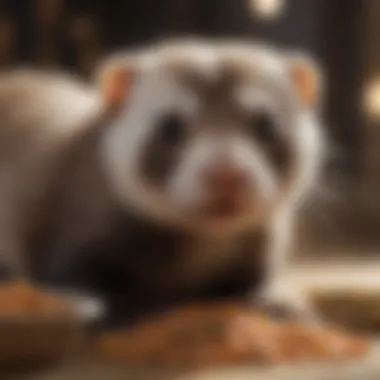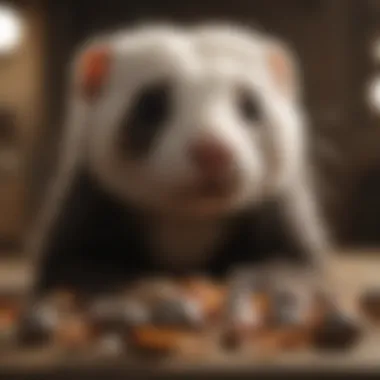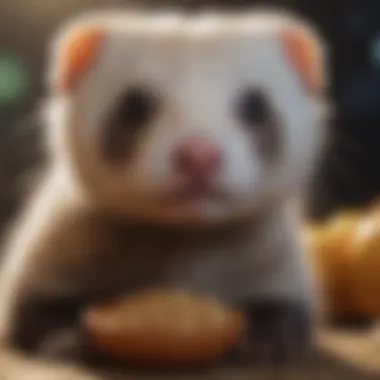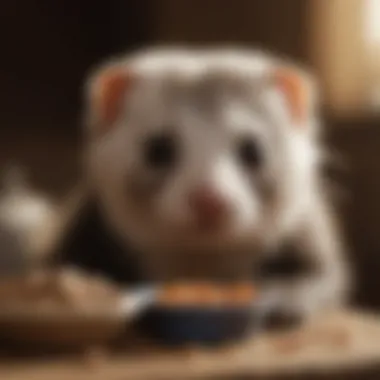The Feline Connection: Can Ferrets Safely Consume Cat Food?


Animal Species Profile
Ferrets are small carnivorous mammals known for their playful nature and distinctive appearance. Their slender bodies, elongated with a pointed snout, are covered in soft fur, often in shades of white, brown, or black. These curious creatures have a mischievous demeanor, characterized by their agile movements and inquisitive nature.
Origins of the ferret can be traced back to Europe, where they were domesticated for hunting purposes due to their keen sense of smell and sharp hunting instincts. Over time, ferrets have become popular companion animals cherished for their endearing personalities.
In the wild, ferrets typically inhabit grasslands, forests, and semi-aquatic environments. They are skilled burrowers, utilizing their flexible bodies to navigate underground tunnels with ease. Social in nature, ferrets engage in playful interactions with their kind, displaying a range of behaviors that foster camaraderie and group dynamics.
Unique Facts & Trivia
Ferrets are known for their distinctive odor, which is produced by their scent glands for communication and territory marking. Despite this trait, ferrets are clean animals that groom themselves regularly, maintaining a level of hygiene akin to cats.
One remarkable feature of ferrets is their sleep patterns, as they are crepuscular creatures most active during dawn and dusk. This nocturnal behavior aligns with their hunting instincts, allowing them to seek prey under the cover of darkness.
In terms of behavior, ferrets exhibit a playful demeanor, often engaging in games of chase and explore. Their curious nature leads them to investigate their surroundings thoroughly, making them adept at finding hiding spots and navigating through narrow gaps with ease.
When it comes to diet, ferrets are obligate carnivores, meaning their diet should primarily consist of meat. While providing commercial ferret food is ideal, some ferret owners may opt to incorporate high-quality cat food into their pets' diet. However, caution must be exercised, as not all cat food is suitable for ferrets due to variations in nutrient content.
Pet Care & Tips
For those considering ferrets as pets, it's essential to understand their specific care requirements to ensure their health and well-being. Ferrets thrive in a spacious environment enriched with tunnels, toys, and climbing structures to stimulate their active minds.
When selecting a ferret-friendly diet, opt for reputable brands of ferret food that meet their dietary needs. If supplementing with cat food, choose high-protein, low-carb options to support their carnivorous nature. Always consult with a veterinarian knowledgeable about ferrets' nutritional needs to create a well-rounded diet plan.


Regular veterinary check-ups are crucial for monitoring your ferret's health and addressing any potential issues promptly. Training your ferret with positive reinforcement techniques can help establish boundaries and foster a harmonious relationship based on trust and respect.
By prioritizing your ferret's mental and physical well-being, you can ensure a fulfilling and enriching life for these captivating companions.
Introduction Nguyen and Savini, in their examination of the dietary habits of ferrets, delve into the intricate world of small carnivores' nutritional requirements. By specifically addressing the compatibility of cat food with ferrets' diets, the article sheds light on this often overlooked aspect of pet care. For individuals seeking to optimize their ferrets' health, understanding what cat food is safe for consumption by these animals becomes paramount. The following sections will provide a detailed analysis of the carnivorous nature of ferrets, their specific nutritional needs, and the significance of taurine in their diet.
Understanding Ferret's Dietary Needs
Ferrets have distinct dietary requirements that must be adequately addressed to ensure their optimal health and well-being. Understanding the dietary needs of ferrets is paramount in providing a comprehensive guide for ferret owners. These small, carnivorous mammals have specific nutritional demands that differ from other household pets. By exploring their dietary preferences and physiological makeup, we can tailor their diet to meet these unique needs effectively.
Carnivorous Nature of Ferrets
Ferrets are obligate carnivores, meaning their diet should consist primarily of animal-based proteins. Unlike omnivores, ferrets lack the anatomical capacity to efficiently digest plant matter. Their short digestive tract and high metabolic rate necessitate a diet rich in animal proteins to fulfill their energy requirements. Feeding ferrets diets high in carbohydrates can lead to digestive issues and nutritional deficiencies due to their carnivorous nature.
Specific Nutritional Requirements
Due to their carnivorous nature, ferrets have specific dietary requirements that include high levels of proteins and fats. Proteins are essential for muscle development, cell repair, and overall growth in ferrets. Fats serve as a concentrated energy source for these energetic animals and aid in maintaining their sleek coats and healthy skin. Additionally, ferrets require certain vitamins and minerals to support their metabolic processes and overall health, making a balanced diet crucial for their well-being.
Importance of Taurine
Taurine is a vital amino acid for ferrets as they are unable to synthesize it endogenously. This essential nutrient plays a crucial role in various physiological functions, including vision, cardiovascular health, and reproductive success in ferrets. A deficiency in taurine can lead to severe health issues such as heart disease and poor vision. Ensuring that ferrets receive adequate taurine through their diet is imperative to prevent these potential health complications and maintain their overall vitality.
Risks of Feeding Cat Food to Ferrets


Feeding cat food to ferrets may pose significant risks due to several factors that need to be considered carefully. Firstly, cat food generally contains a high percentage of protein, which can be problematic for ferrets because their dietary requirements differ from cats. Ferrets are obligate carnivores and have specific dietary needs that may not align perfectly with the nutritional composition of standard cat food. This mismatch in nutritional balance could lead to digestive issues, obesity, or other health complications in ferrets if they are consistently fed cat food. Moreover, certain additives and fillers commonly found in commercial cat foods may not be suitable for ferrets. These additives could potentially upset their digestive systems or cause adverse reactions. Therefore, it is crucial for ferret owners to be cautious about the ingredients present in the cat food they choose to feed their pets. Lastly, feeding ferrets cat food exclusively can result in long-term health problems such as nutrient deficiencies or excessive intake of certain nutrients that may harm their overall well-being. Understanding these risks is vital for maintaining the health and longevity of ferrets.
High Protein Content
The high protein content in cat food might seem beneficial for ferrets at first glance, considering their carnivorous nature. However, the quality and source of protein differ between what is ideal for cats and ferrets. Ferrets require a diet high in animal-based protein, specifically meat, to meet their unique nutritional needs. While cat food may contain protein, it may not necessarily provide the optimal type or amount of protein required by ferrets. Consuming excessive protein from sources that do not align with their dietary requirements can lead to health issues such as kidney problems or liver complications in ferrets. Therefore, when selecting cat food for ferrets, it is essential to prioritize quality protein sources that cater to the specific needs of these small carnivores.
Additives and Fillers
Cat food often contains additives and fillers to enhance flavor, texture, and shelf-life. However, these additives may not be suitable for ferrets and could potentially harm their health. Fillers like grains or vegetables that are commonly used in cat food as bulking agents may not provide any nutritional value to ferrets and could even lead to digestive issues or nutrient deficiencies. Additionally, artificial colors, flavors, and preservatives used in some cat foods could trigger sensitivities or allergies in ferrets. It is crucial for ferret owners to carefully examine the ingredients list of cat food to avoid harmful additives and fillers that may have a negative impact on their pets' well-being.
Potential Health Complications
Feeding ferrets cat food exclusively without considering their specific dietary requirements can result in a multitude of health complications. Ferrets have a higher need for animal-based protein, fat, and certain vitamins compared to cats. Cat food, although rich in protein, may lack the essential nutrients required to support the overall health of ferrets. This imbalance in nutrition can lead to health issues such as malnutrition, obesity, gastrointestinal problems, or even urinary tract disorders in ferrets. Moreover, some ingredients commonly found in cat food, like plant-based proteins or excessive carbohydrates, may not be easily digestible by ferrets and can disrupt their digestive system. Understanding the potential health complications associated with feeding cat food to ferrets is essential for conscientious pet owners to ensure the well-being and vitality of their beloved companions.
Choosing Suitable Cat Food for Ferrets
Within the realm of ferret care, selecting appropriate food sources is of paramount importance to ensure these petite carnivores thrive. Ferrets, being obligate carnivores, necessitate a diet rich in high-quality protein sources to maintain optimal health and vitality. Therefore, when contemplating what cat food ferrets can consume, emphasis must be placed on identifying cat food brands that offer premium protein content. Cat foods crafted from real meat, such as chicken, turkey, or beef, serve as exemplary choices due to their bioavailable protein profiles, aiding in muscle development and overall well-being.
When steering through the plethora of feline food options, prioritizing selections with low carbohydrate content emerges as another crucial facet. Minimizing carbohydrate intake mitigates the risk of obesity, insulin resistance, and other associated metabolic complications in ferrets. Opting for cat foods with minimal grains, fillers, and unnecessary carbohydrates can prove instrumental in safeguarding the digestive and metabolic health of your cherished ferret companion.
Furthermore, vigilance toward harmful ingredients within cat food formulations is non-negotiable when catering to ferret dietary requirements. In the pursuit of feline foods suitable for ferrets, it is indispensable to scrutinize labels meticulously and avoid additives like artificial colors, flavors, and nonessential fillers. Steering clear of ingredients detrimental to ferret well-being, such as grains, excessive sugar, and artificial preservatives, stands as a cardinal rule in upholding the long-term health of these endearing creatures. By adhering to these guidelines and being discerning in your selection process, you are poised to provide your ferret with a diet that aligns optimally with its nutritional needs, fostering a flourishing and contented companion.
Transitioning Ferrets to Cat Food


When considering the transition of ferrets to cat food, it is crucial to proceed cautiously and methodically. Ferrets, being obligate carnivores, have specific dietary requirements that differ from other domestic pets. Transitioning their diet must be done gradually to prevent any digestive upsets or nutritional imbalances.
Ferrets thrive on diets high in animal-based protein, moderate in fat, and very low in carbohydrates. Cat food can serve as a suitable option, but not all cat foods are created equal. It is essential to select high-quality cat food that mirrors the nutritional profile ferrets need for optimal health.
Before transitioning ferrets to cat food, it's advisable to consult with a veterinarian knowledgeable about ferret nutrition. They can provide expert guidance on suitable cat food brands, nutrient content, and the pace of transition based on the individual needs of your ferret.
Start the transition process by mixing a small amount of cat food with your ferret's current food. Gradually increase the proportion of cat food while decreasing their original food over a period of 1-2 weeks. Monitor your ferret closely during this time for any signs of gastrointestinal distress or reluctance to eat.
As ferrets adjust to the new diet, observe their energy levels, coat condition, and overall well-being. Adjust the feeding amounts based on their activity level and body condition to maintain a healthy weight. Some ferrets may take longer to adapt to the new diet, so patience is key during this transition period.
Remember, each ferret is unique, and their response to dietary changes may vary. Providing a diverse diet through a combination of high-quality cat food, occasional raw meat treats, and fresh water is fundamental for meeting their nutritional needs. By transitioning ferrets to cat food thoughtfully and under expert guidance, you can ensure they receive a balanced and enriching diet for a vibrant life.
Consulting with a Veterinarian
Consulting with a veterinarian is a crucial aspect when considering the dietary requirements of ferrets. Ferrets, being small carnivores with unique nutritional needs, require specialized care and attention. Seeking advice from a veterinarian who is knowledgeable about ferret health and diet is essential for ensuring the well-being and longevity of these beloved pets.
Veterinarians play a key role in guiding ferret owners on the suitable types and quantities of cat food that can be safely incorporated into a ferret's diet. They can provide valuable insights into the specific nutritional requirements of ferrets and recommend cat food brands that meet these requirements. Additionally, veterinarians can help in identifying any potential health risks or allergies that ferrets may have towards certain ingredients commonly found in cat food.
Furthermore, consulting with a veterinarian allows for personalized advice tailored to the individual needs of each ferret. Factors such as age, activity level, and any existing health conditions are taken into consideration when devising a diet plan. Veterinarians can also monitor the transition process from regular ferret food to cat food, ensuring a smooth adaptation without any digestive issues.
In summary, the guidance and expertise of a veterinarian are invaluable when it comes to incorporating cat food into a ferret's diet. Their professional knowledge and experience facilitate a careful and informed approach to meeting the nutritional needs of ferrets, promoting their overall health and well-being.
Conclusion
Understanding the risks associated with feeding cat food to ferrets is crucial. Cat food tends to have high protein content, which can be beneficial, but caution must be exercised as excessive protein levels could lead to health complications in ferrets. Additionally, additives and fillers commonly found in cat food may not align with the dietary needs of ferrets, emphasizing the importance of choosing quality protein sources and avoiding harmful ingredients.
When transitioning ferrets to cat food, a gradual approach is recommended to prevent digestive issues. Consulting with a knowledgeable veterinarian before altering your ferret's diet is prudent. A veterinarian can provide tailored guidance on suitable cat food options, ensuring a smooth transition and addressing any concerns related to the nutritional adequacy of the new diet.
In essence, the conclusion encapsulates the essence of this article: promoting the well-being of ferrets by making informed choices regarding their dietary needs. By prioritizing quality protein sources, monitoring taurine intake, and being mindful of potential health risks, ferret owners can ensure a balanced and wholesome diet for their beloved companions. The guidance provided throughout this article serves as a beacon for responsible pet ownership, catering to the specific requirements of these fascinating carnivores.







